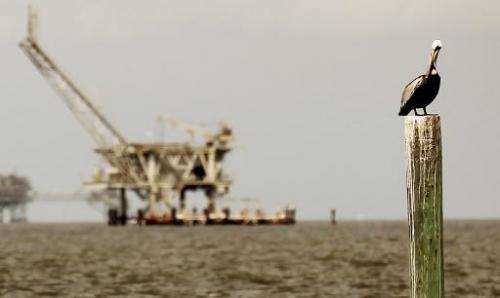A pelican rests on a piling with an oil rig in the background April 18, 2011 in Dauphin Island, Alabama
Birds, fish, dolphins and turtles are still struggling in the Gulf of Mexico, four years after the worst oil spill in US history, a leading wildlife group said Tuesday.
The 2010 BP spill spewed 4.9 million barrels of oil into the waters off Louisiana, also sullying the coastlines of Mississippi, Alabama, Texas and Florida.
"The science is telling us that the impacts of this are far from over," said Doug Inkley, senior scientist at the National Wildlife Federation.
"Based on other oil spills, the impacts are likely to last for years, if not decades."
A report issued by the National Wildlife Federation summarized recent scientific studies on 14 different types of creatures affected by the spill.
Researchers have found evidence that dolphins in Louisiana's heavily oiled Barataria Bay suffer from abnormal hormone levels, lung disease and anemia.
Overall, dolphins have been stranding at three times the historic rate, with some 900 washing up dead or dying from 2010 until 2013, the report said.
About 500 dead sea turtles have been found annually in the area, also a rate much higher than that seen in years prior to the disaster.
Bluefin and yellowfin tuna have been shown to suffer irregular heartbeats due to a chemical in oil from the spill, which began after the Deepwater Horizon drilling rig exploded and sank, killing 11 people.
Toxic oil compounds have been found at increasing levels in the blood samples of loons that winter along the Louisiana coast, it added.
Sperm whales that were closer to the well have higher levels of DNA damaging metals than those in other parts of the world.
Oil is still being removed from the coast, too, said Sara Gonzalez-Rothi, the National Wildlife Federation's senior policy specialist for Gulf and coastal restoration.
"Last year, nearly five million pounds of oiled material from the disaster were removed from Louisiana's coast," she said.
"And that's just what we've seen. An unknown amount of oil remains deep in the Gulf."
Earlier this month, the US Environmental Protection Agency ended its ban on BP obtaining government contracts following the disaster.
The five-year deal with the EPA will allow the British company to pursue new oil exploration leases in deepwater tracts in the Gulf of Mexico.
In pleading guilty to the spill, BP agreed to pay the government $4.5 billion to settle criminal charges in the case.
It also agreed in 2012 to settle damage claims by businesses and individuals for about $7.8 billion.
© 2014 AFP























